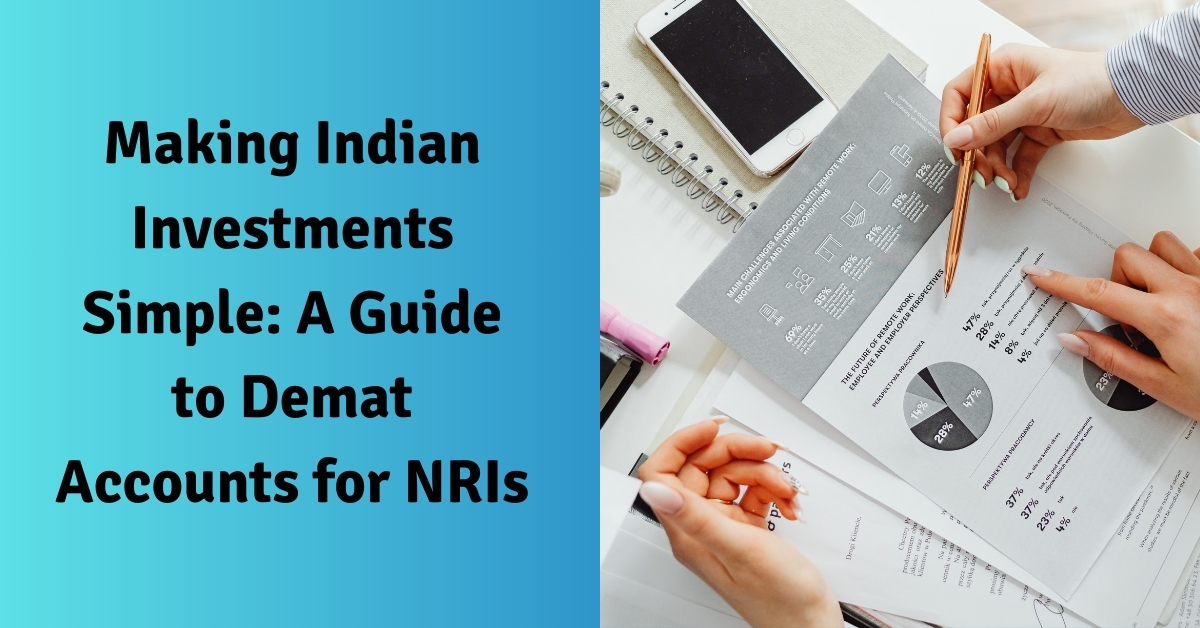Making Indian Investments Simple: A Guide to Demat Accounts for NRIs

Are you an NRI who’s keen on investing in the Indian stock market but finds the process daunting from overseas? You’re not alone in this journey. Many non-resident Indians encounter similar obstacles when managing their Indian investments from abroad.
The good news? Demat accounts provide a contemporary, efficient solution. By digitizing securities, these accounts do away with physical paperwork, revolutionizing how you trade and manage investments.
Let’s delve into the world of demat accounts for NRIs, exploring their key features, advantages, and setup process.
Understanding Demat Accounts
A Demat (Dematerialized) Account serves as your digital vault for securities, replacing traditional paper certificates. It’s an essential tool in India’s financial infrastructure, specifically designed to help NRIs and OCIs participate in the Indian market.
Through these accounts, non-resident investors can effortlessly manage various financial instruments – from stocks and bonds to ETFs – in a secure digital environment that aligns with their financial objectives.
Why Demat Accounts Matter for NRIs?
For NRIs navigating cross-border investments, regulatory compliance and logistics can be complex. Demat accounts streamline these challenges in several ways:
- Investment Facilitation: Execute trades seamlessly without dealing with physical documentation
- Compliance Management: Meet regulatory requirements by submitting necessary documentation, including NRI status verification, passport details, and foreign address proof
- Portfolio Oversight: Keep track of all investments in one centralized digital location
- Enhanced Security: Benefit from secure digital transactions that reduce errors and delays
- Market Access: Connect directly with major Indian exchanges like NSE and BSE, plus access various investment vehicles
Key Advantages for NRI Investors
Consider these significant benefits of maintaining an NRI Demat account:
- Transforms physical certificates into secure digital assets
- Provides convenient portfolio monitoring through web and mobile platforms
- Opens doors to diverse investment opportunities in the Indian market
- Reduces costs compared to physical security management
- Consolidates all investments under one digital roof
Setting Up Your NRI Demat Account
Follow this step-by-step process to establish your account:
- Select a suitable depository participant (DP) offering NRI services
- Fill out the account application with precise details
- Compile required documentation:
- NRI status verification
- PAN card
- Overseas address evidence
- Indian address proof (if applicable)
- Recent photographs
- FEMA declaration
- Submit completed documentation to your chosen DP
- Wait for verification and processing
- Set up an NRE/NRO bank account linkage
- Receive and activate your account credentials
Conclusion
For NRIs looking to invest in Indian markets, Demat accounts represent an indispensable tool that combines convenience with security. Understanding the setup process, benefits, and potential hurdles helps non-resident investors make well-informed decisions and optimize their investment approach.
FAQs’
1. How does a Demat account differ from standard NRI banking?
Ans- While NRI bank accounts handle monetary transactions, Demat accounts specifically manage your investment holdings electronically. Think of your bank account as your wallet and your Demat account as your investment portfolio manager.
2. What qualifies an NRI to open a Demat account?
Ans- Eligible applicants must have valid NRI status, current passport, and an active NRE/NRO account. Compliance with RBI and SEBI guidelines is mandatory for account approval.
3. What paperwork does an NRI need to submit?
Ans- Essential documentation includes your completed application, authenticated copies of passport, residence proof, PAN card, address verification (both overseas and Indian), current photographs, and signed FEMA declaration.
4. What can NRIs invest in through their Demat account?
Ans- While NRIs can access most investment options including equities, bonds, and mutual funds, certain sector-specific limitations apply under FEMA regulations and regulatory guidelines.
5. How do overseas residents manage their accounts?
Ans- Digital platforms provided by DPs enable remote account management, including portfolio monitoring and trade execution, supported by dedicated customer service for international clients.
6. Is international trading possible through NRI Demat accounts?
Ans- Yes, global trading is supported through DP-provided platforms, offering real-time market access regardless of your location.
7. What costs should NRIs expect?
Ans- Account expenses include initial setup fees, yearly maintenance charges, trading commissions, and service fees, varying by provider. Comparison shopping is recommended for optimal value.
8. What are the tax considerations for NRI Demat accounts?
Ans- Investment income faces taxation, including gains, dividends, and interest. Rates vary by investment type and duration, with potential relief through DTAA agreements between India and your residence country.
9. What happens to a Demat account if an NRI returns to India permanently?
Ans- Upon returning to India permanently, NRIs must convert their NRI Demat account to a regular resident Demat account. This involves updating their residential status and submitting necessary documentation to their depository participant.
10.Can NRIs hold multiple Demat accounts simultaneously?
Ans- Yes, NRIs can maintain multiple Demat accounts, either with the same or different depository participants. However, they must declare all accounts and ensure compliance with relevant regulations for each account.



